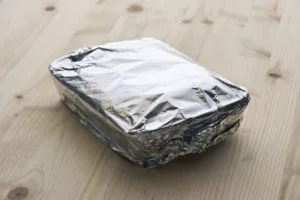Many kitchens always have aluminum foil available. It’s commonly used for cooking fish, vegetables, and more in the oven and on the grill as a baking tray liner. Despite its widespread use, people often question its safety.

Aluminum is a naturally occurring element found in various things, including plants, water, and soil. It’s the most abundant metal globally, constituting roughly 8% of the Earth’s mass. Even some foods, especially citrus fruits, contain it. In reality, we all ingest small amounts of metal regularly, whether we use aluminum foil or not. Fortunately, our bodies efficiently eliminate aluminum through feces, so small amounts usually pose no issues.
However, cooking with aluminum foil may increase the metal content in your food. This happens because the foil directly contacts the food, and heat can cause chemicals from the foil to transfer into your meal. The duration and temperature of cooking, along with the amount of liquid used (which aids in chemical transfer), all influence the aluminum transfer. Adding acidic substances like lemon juice can also boost the aluminum levels in your food, as acids increase the transfer process.





